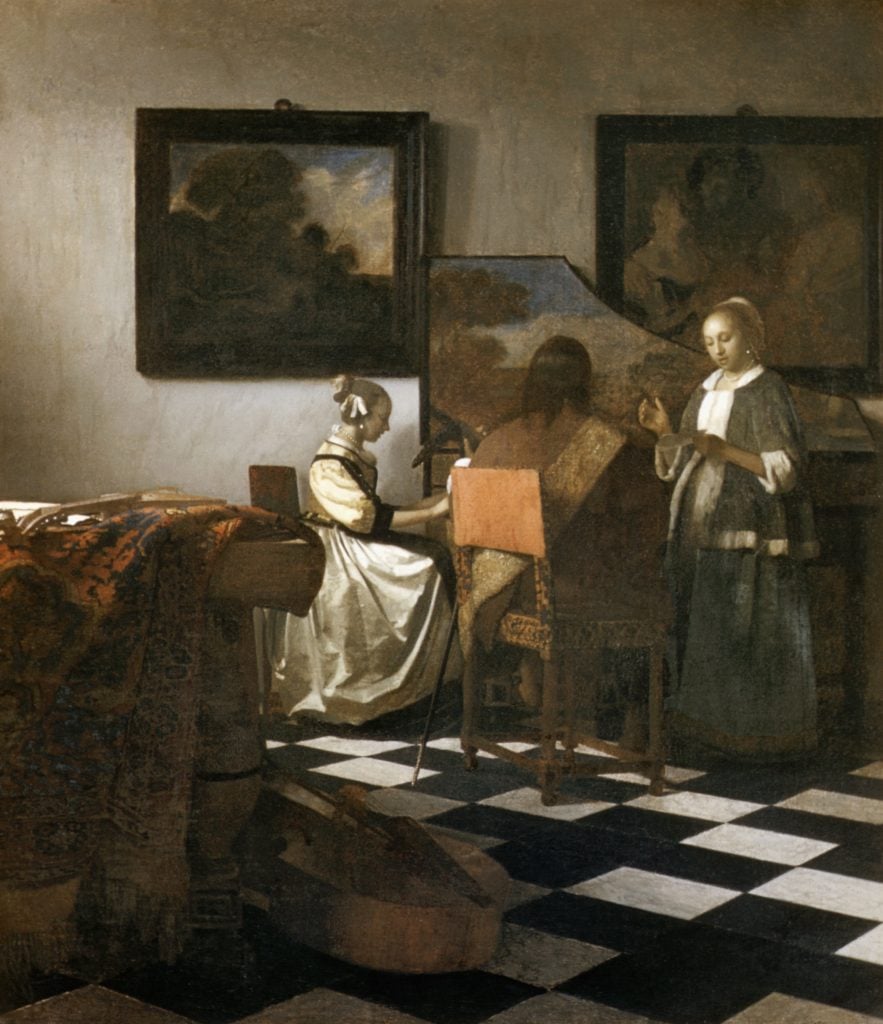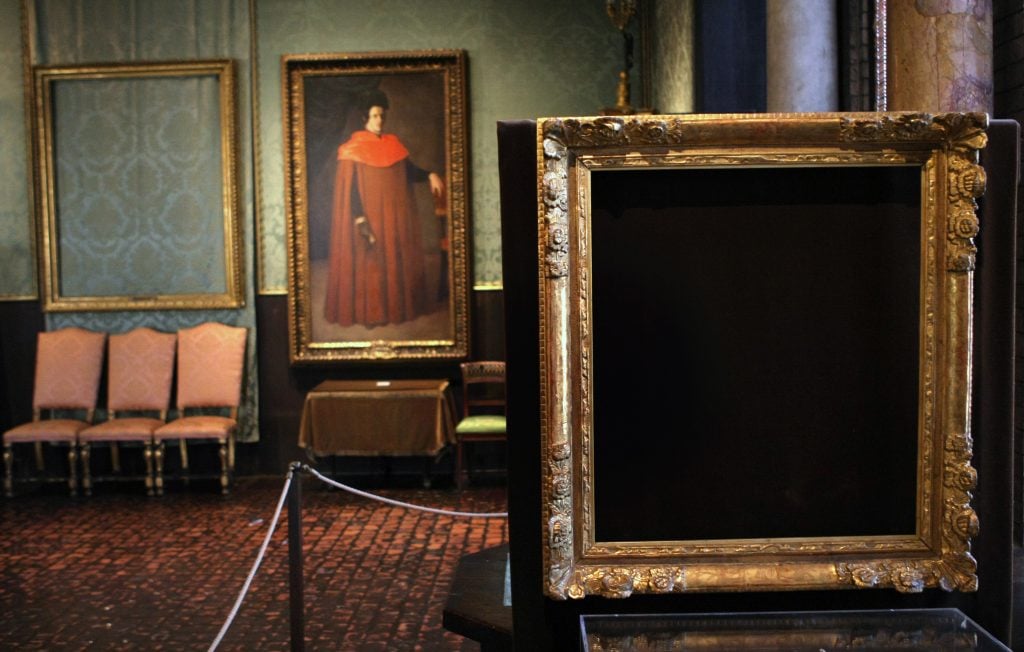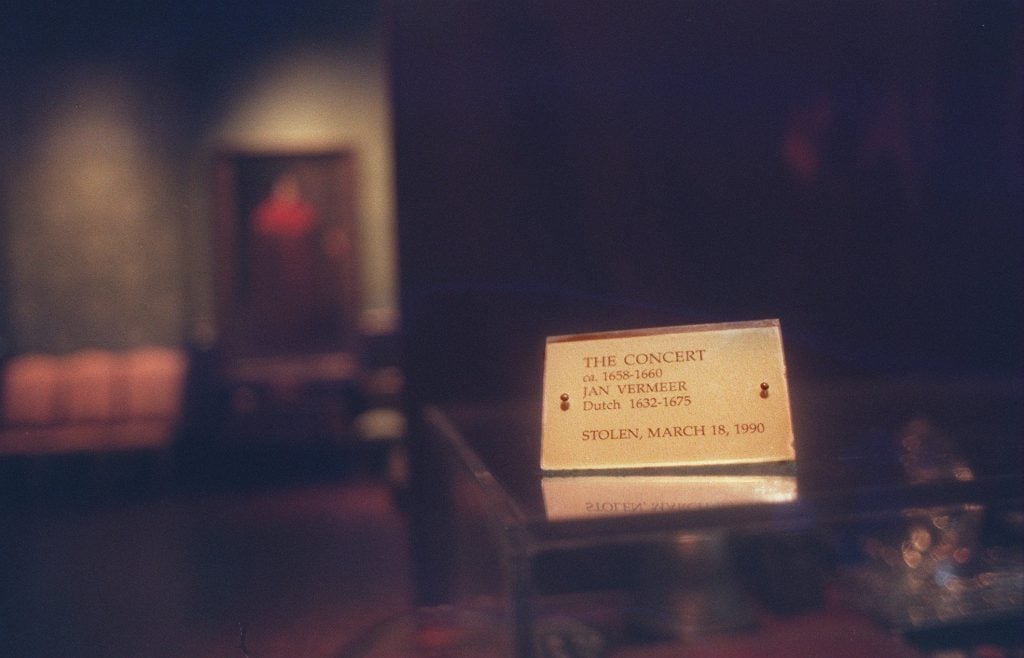Archaeology & History
The Hunt: The World’s Most Valuable Stolen Painting
Vermeer’s domestic scene has an estimated value of $250 million.

Vermeer’s domestic scene has an estimated value of $250 million.

Verity Babbs

The Hunt explores art and ancient relics that are—alas!—lost to time. From the Ark of the Covenant to Cleopatra’s tomb, these legendary treasures have long captured the imaginations of historians and archaeologists, even if they remain buried under layers of sand, stone, and history.
The Concert was painted by Johannes Vermeer around 1665, and shows three upper-class figures: a woman seated at a harpsichord, a man playing the lute with his back to the viewer, and a second female figure standing and singing. Two paintings hang on the wall (one of them a copy of Dirck van Baburen’s The Procuress, which was owned by Vermeer’s mother-in-law) and the lid of the harpsichord also reveals a painted landscape. The luxurious clothing and fashionable interior denote the figures’ class, and the man’s shoulder belt and sword indicate that he is a member of the civil militia.
While Vermeer’s scenes of music-making have often been interpreted to be euphemistic (and large stringed instruments laid on the floor can be seen as distinctly phallic), the moral element warning against extra-marital seduction doesn’t seem present in The Concert. They all seem pretty focused on their instruments.
The painting was first documented over 100 years after its creation, in 1780. It was acquired by the collector and philanthropist Isabella Stewart Gardner in 1892 at a Parisian auction of the estate of the critic Théophile Thoré for $5,000. Aptly, Thoré had played a major role in revitalizing Vermeer’s reputation in the 19th century. The Concert was the young collector’s first major purchase. It was on display at the Boston museum that bears Gardner’s name from the time of the purchase until it was stolen.
In the early hours of March 18, 1990 (the day after St. Patricks Day, when many Bostonians would be sound asleep after a night’s revelry), intruders posing as local police gained entry to the museum. The Concert was among 13 artworks they made off with in what is now considered the world’s greatest art heist.

An empty frame where Vermeer’s The Concert (ca. 1658–66) once hung at the Isabella Stewart Gardner Museum. Photo: David L Ryan/The Boston Globe via Getty Images.
Only one of the two museum guards on duty at the time was at the security desk when the thieves entered the building, claiming that they were responding to a disturbance in the courtyard. The security guard let them in, and was promptly handcuffed by the thieves who had requested he show them his ID and said that there was a warrant out for him. They then revealed that it was a robbery, apparently telling the young guard that if he remained calm he wouldn’t get hurt. The guard replied, “They don’t pay me enough to get hurt,” before he and the other guard were bound with duct tape and tied to pipes in the museum’s basement. The guards would later tell press that they were undertrained and inexperienced.
The thieves spent 81 minutes inside the museum, stealing 13 works estimated to have a total value of $500 million at the time. Artworks stolen included pieces by Edouard Manet, Edgar Degas, and Rembrandt van Rijn. Some were damaged in the process. The thieves cut some of the paintings out of their frames, which the museum has displayed empty ever since.

A sign at the Isabella Stewart Gardner Museum explaining the theft of Jan Vermeer’s The Concert. Photo: Suzanne Kreiter/The Boston Globe via Getty Images.
The Boston Police Department’s main suspect was James “Whitey” Bulger, who was already on the FBI’s most wanted list as a violent mob boss. Bulger—then 81 years old—was arrested on June 22, 2011, after a 16-year manhunt, but has never confessed to any involvement in the crime. Two years later the FBI announced that they had gotten to the bottom of the crime, but did not release any names.
Subsequent press releases suggest that the crime was pulled off by members of a criminal organization, and Christopher Marinello, CEO & Founder at Art Recovery International, referred to it as “only a matter of time” before “somebody will rat somebody else out.” Another suspect, Robert “Bobby” Gentile, died in 2021.
The Gardner robberies are one of art history’s most famous thefts, and were explored in 2021 in a four-part Netflix series, This Is a Robbery. In 2015, the painting was estimated to be worth $250 million, making it the world’s most valuable stolen object. The museum is offering a $10 million reward for information leading to the recovery of the stolen works.